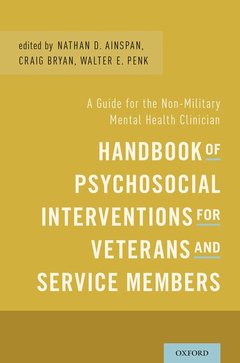Description
Handbook of Psychosocial Interventions for Veterans and Service Members
A Guide for the Non-Military Mental Health Clinician
Coordinators: Ainspan Nathan D., Bryan Craig, Penk Walter E.
Language: English
Subject for Handbook of Psychosocial Interventions for Veterans and...:
Publication date: 05-2016
488 p. · 15.5x23.4 cm · Paperback
488 p. · 15.5x23.4 cm · Paperback
Description
/li>Biography
/li>
The United States is in the midst of the largest military demobilization in its history. This is leading to an increase in the demand for mental health clinicians who can provide services to hundreds of thousands of military veterans and members of the military. Nearly two million Americans have been deployed to the wars in the Middle East, and thousands of them have been deeply affected, either psychologically, physically, or both. Projections suggest that 300,000 are returning with symptoms of PTSD or major Depression; 320,000 have been exposed to probable Traumatic Brain Injuries; and hundreds of thousands are dealing with psychological effects of physical injuries. Other veterans and members of the military without injuries will seek treatment to help them with the psychological impact of serving in the military, being deployed, or transitioning and reintegrating back into the civilian world. As an example, hundreds of thousands of service members are also leaving the armed forces earlier than they anticipated and will need to quickly adjust to life as civilians after assuming that they would have many more years in the military. Many will be leaving the military because of demobilizations and downsizing due to budget cuts. Current proposed cuts will shrink the military force to the same size it was in 1940. The Pew Center reports that 44% of veterans from the current wars are describing their readjustment to civilian life as "difficult," and many of them are and will be turning to civilian mental health and primary care clinicians for assistance. The Handbook of Psychosocial Interventions for Veterans and Service Members is a "one stop" handbook for non-military clinicians working with service members, veterans, and their families. It brings together experts from the Department of Defense, the Department of Veterans Affairs, veteran service organizations, and academia to create the first comprehensive guidebook for civilian clinicians. In addition to covering psychiatric disorders such as depression, anxiety, and PTSD, this book also offers information about psychosocial topics that impact military personnel and their loved ones and can become part of treatment (e.g., employment or education options, financial matters, and parenting concerns), providing the most recent and cutting-edge research on the topics. Chapters are concise and practical, delivering the key information necessary to orient clinicians to the special needs of veterans and their families. The Handbook of Psychosocial Interventions for Veterans and Service Members is an essential resource for private practice mental health clinicians and primary care physicians, as well as a useful adjunct for VA and DOD psychologists and staff.
Nathan D. Ainspan, Ph.D., is the Research Psychologist with the Transition to Veterans Program Office (TVPO) of the Office of the Secretary of Defense. Dr. Ainspan has conducted research, written, and spoken extensively about the psychological impact of the transition from the military into civilian life. His research focus has been on improving civilian employment opportunities for returning service members and the psychosocial benefits that employment can have on wounded warriors and injured veterans and people with disabilities. Craig J. Bryan, PsyD, ABPP, is the Executive Director of the National Center for Veterans Studies and Assistant Professor in the Department of Psychology at The University of Utah. Dr. Bryan served on active duty in the U.S. Air Force as a clinical psychologist and deployed to Iraq in 2009. He currently researches suicide and PTSD in the military. Walter Erich Penk, PhD, ABPP, is a Professor in Psychiatry and Behavioral Sciences at Texas A&M College of Medicine. His clinical and research interests center on post-traumatic stress disorders. His first PTSD studies were published in 1981, focusing on psychosocial rehabilitation for PTSD and substance abuse among veterans. Currently, he concentrates on student veterans and combat veterans transitioning to civilian occupations.
© 2024 LAVOISIER S.A.S.




